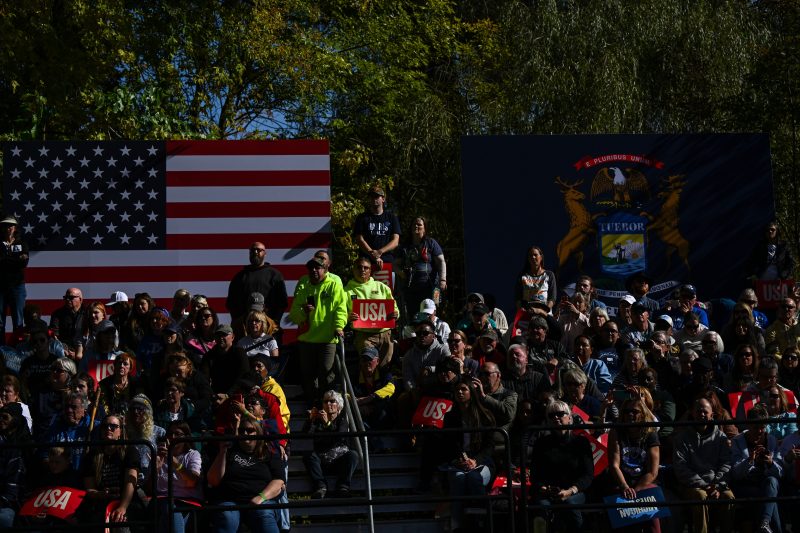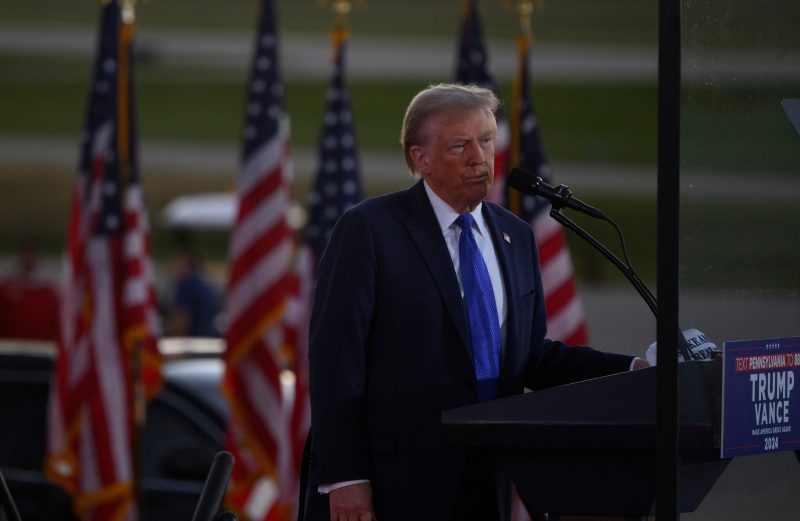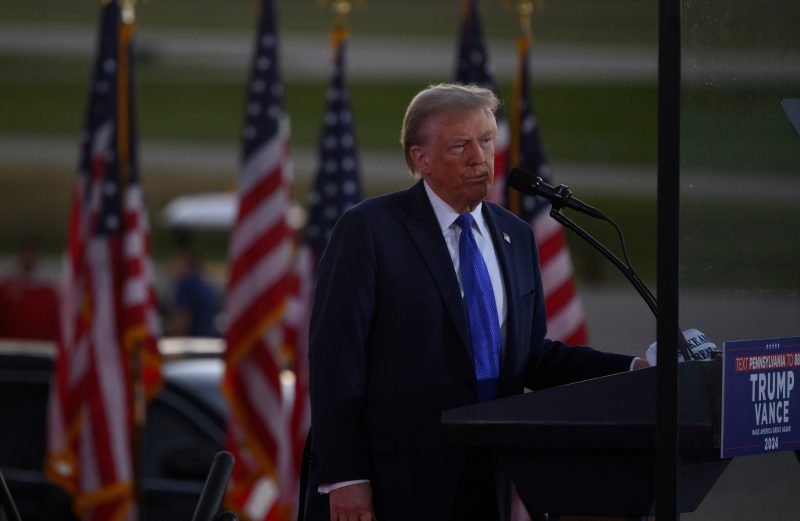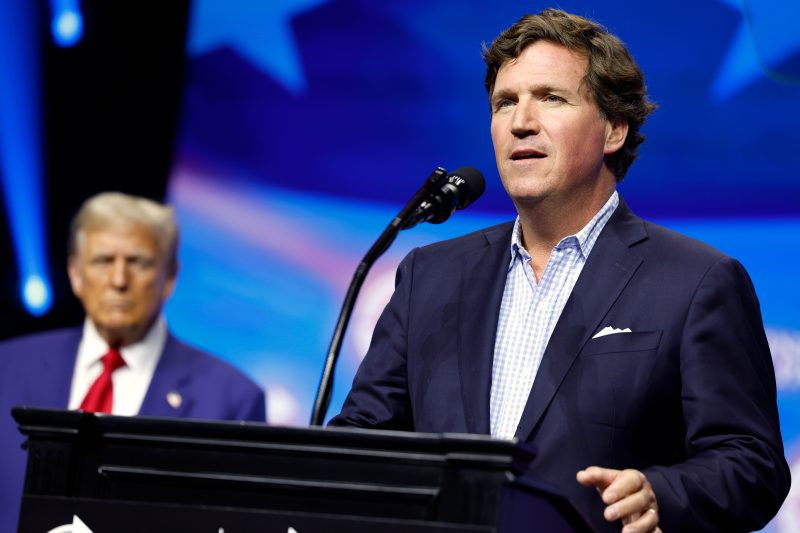
Harris and Trump fight for an edge with working-class voters in Michigan
DETROIT — Kamala Harris and Donald Trump converged on the battleground state of Michigan on Friday, pushing hard for an edge with blue-collar voters as they sparred over their records on creating jobs for union workers, their plans to boost manufacturing jobs and their respective energy levels on the campaign trail.
Harris is drawing strong support among college-educated voters in suburban areas of Detroit, but to prevail in Michigan, she faces pressure to bolster her backing among union workers. At three stops in the state on Friday, she tried to cut into Trump’s advantage with blue-collar voters who helped him win this state in 2016, challenging the sweeping but often vague promises the former president has made about creating more jobs and ramping up domestic manufacturing.
In both Grand Rapids and Lansing, the vice president accused Trump of failing union workers during his first term because he did not revive manufacturing nor support organized labor in its battles with management, warning that Trump is now making the same “empty promises” and “hoping you will forget how he let you down the last time.”
“No matter what the noise is out there, he is no friend of labor,” Harris said. “Look at the record, and let’s not fall for the okie doke.”
A short time later in Hamtramck, Trump painted a contrasting portrait of himself as a staunch friend of the American worker, saying his ability to grow jobs is the best guarantee of their well-being. “So many of them … support me because I’m going to bring back the auto jobs,” Trump said of United Auto Workers members.
The UAW has endorsed Harris, and she enjoys strong support from its president, Shawn Fain, though Trump argues that many rank-and-file UAW members back him. The International Brotherhood of Teamsters, another powerful union, decided last month it would not make an endorsement this year after decades of supporting Democratic presidential candidates, though many individual Teamsters chapters and locals then rushed to back Harris.
While Harris and President Joe Biden have taken more overtly pro-union positions, supported organized labor in various battles and walked the picket line with striking workers, Trump has sought to play up the cultural affinity that many blue-collar workers feel for him. On Friday, at a manufacturing roundtable in Oakland County, Mich., Trump touted his support among union members and described Teamsters president Sean O’Brien as a “great guy.”
The convergence of the two candidates in a single Midwestern state Friday reflected their increasingly bitter battle for perhaps a half-dozen swing states that will determine the winner of the electoral college. It also showcased how, in a campaign that features razor-thin margins, Harris and Trump are engaging in hand-to-hand combat to win even the smallest boost with an array of voting blocs. The battlegrounds of Michigan, Wisconsin and Pennsylvania have seen the preponderance of visits by Harris and Trump this year, along with Georgia, Arizona and Nevada.
Trump won Michigan by less than half a percentage pointin 2016 after performing better than expected with working-class voters, many of whom had previously supported Democrats. In 2020, Biden won the state back in part by rebuilding Democratic support among union members and boosting turnout among Black voters — as Harris will try to do on Saturday when she appears with the Grammy-winning singer Lizzo, a Detroit native.
Harris is looking to replicate Biden’s 2020 playbook, but she is contending with a complex array of factors including voters’ frustration with inflation and anger in Michigan’s large Arab American community over Biden’s support of Israel during the war in Gaza. In addition to courting working-class voters, Harris has made a particular effort this week to reach Black men. Some Democrats fear she is underperforming with the demographic.
Seeking to puncture Trump’s enduring appeal among working-class voters, Harris and her campaign have repeatedly pointed to the 2017 tax bill that Trump signed into law, which they say created incentives for American companies to move jobs offshore. On Friday, the vice president also touted funding from the Inflation Reduction Act, the Biden administration’s marquee economic bill, that went to companies in Michigan.
She noted that the legislation allowed General Motors to preserve 650 jobs and upgrade its Grand River assembly plant in Lansing, calling out the Republican vice-presidential nominee, Sen. JD Vance of Ohio, for referring to that grant as “table scraps” in comparison to what Vance said were the benefits a Trump presidency would bring to American workers.
“Trump’s running mate called your jobs table scraps,” Harris said in Lansing. “I will always have your back.”
At UAW Local 652, addressing union members who work at the General Motors Lansing Grand River Assembly Plant, Harris played a clip of Trump denigrating the skills of autoworkers. “He’s got his club, and I’m going to tell you, union workers are not part of his club,” Harris said, adding that Trump has always been a union buster: “Let’s be clear about that, right? No matter what he does in his rallies, let’s be clear about that.”
Campaigning in Michigan in recent weeks, Trump and Vance have promised to increase jobs, especially for autoworkers and other manufacturing employees. Trump in particular has pledged to levy high tariffs on foreign-made goods, which he says will spur domestic production and jobs by encouraging companies to build or keep factories in the United States.
On Friday, he twice recounted an anecdote about an executive who, he said, abandoned plans to build plants abroad because he expected Trump to win and then impose substantial tariffs.
And he repeated his statement that “tariff” is a beautiful word. “I think it’s more beautiful than ‘love,’” Trump said.
Many economists, however, say the sweeping tariffs Trump is proposing could significantly raise prices, harm the stock market and ignite trade wars with other countries.
The Trump-Vance ticket has also gone after Harris in other ways aimed at Michigan workers. Republican ads have falsely claimed that Harris supports an electric vehicle “mandate,” and Vance recently said that Harris “has declared war on the Michigan auto industry.”
With the campaign becoming increasingly personal in recent days, the two candidates also traded barbs over their energy levels on the campaign trail after Harris seized on a report in Politico saying the Trump campaign had withdrawn from potential interviews due to the Republican candidate’s “exhaustion.”
Harris, who has questioned Trump’s fitness for office and his cognitive abilities in myriad ways this week — echoing Trump’s strategy against Biden when he was still in the race — tried out a new line in Grand Rapids. “If you are exhausted on the campaign trail, it raises real questions about whether you are fit for the toughest job in the world,” she said.
The Trump campaign has said the Politico report is false, and the Republican nominee responded a short time later. “Tell me when you’ve seen me take even a little bit of a rest,” Trump said to reporters on a tarmac in Detroit. “I’m not even tired. I’m really exhilarated. You know why? We’re killing her in the polls because the American people don’t want her.”
He also said Harris does not have the energy of a “rabbit,” adding that she is “not a smart person” and “wasn’t born smart.”
Harris also went after Trump for insulting of the city of Detroit, which he visited last week, when he compared it to a “developing nation” and suggested that even a child could do the jobs performed by autoworkers. Harris has criticized Trump for the comments, saying he had “trashed another great American city.”
In Lansing, she mocked Trump for suggesting he is the only person who can create manufacturing jobs — at one point imitating his deep baritone to laughter — as she argued he has “a very different view of workers, of hard work, of the dignity of work.”
“He tries to, you know, do his rhetorical thing at rallies, like he understands what it means to earn a living,” Harris said in Lansing. “He pretends that he understands workers and the hard work and the battle workers face every day to get their due wages and benefits. Well, we’re not falling for the okie doke.”
Voters who gathered in Grand Rapids on a sunny, warm fall day said they were glad to see Harris visiting this part of Michigan.
“This is Michigan, and we understand all of our jobs are on the line,” said Bonnie Norment, 63, an indoor landscaper. “Everything that I hear about what her policies are going to be, that’s the way forward. … Trump, he’s just going to help the few people, the richest Republicans in the area.”



